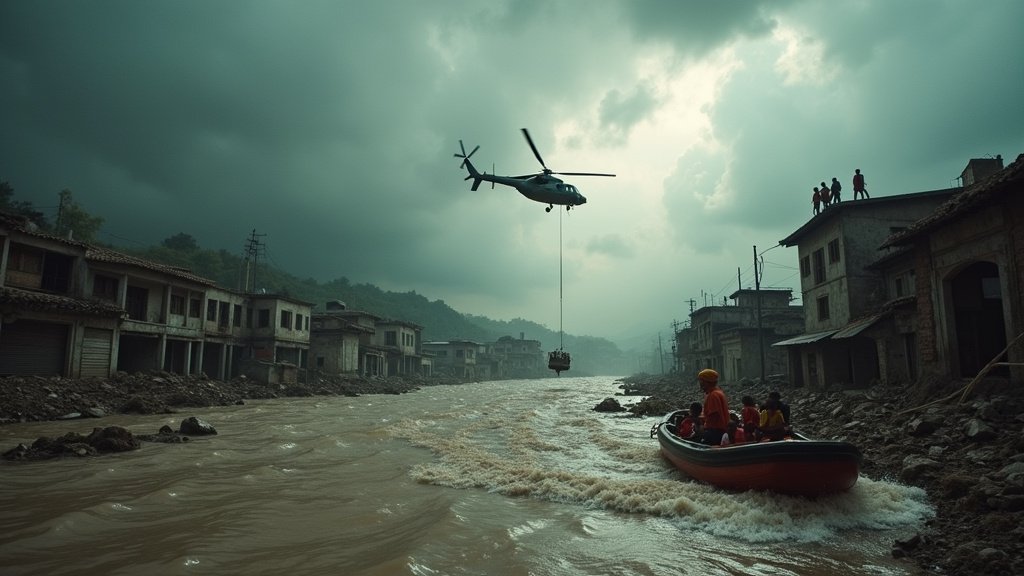A humanitarian crisis of immense scale is unfolding across parts of South Asia as flash floods, triggered by relentless downpours, have claimed the lives of more than 280 people across India and Pakistan. The sudden and overwhelming deluge, marked by its ferocity and speed, has forced thousands to abandon their homes, leaving behind what little they possessed in a desperate scramble for safety. This burgeoning catastrophe has turned once-familiar landscapes into raging torrents, creating a dire situation that continues to escalate. The situation remains particularly precarious in the northern and northwestern regions of Pakistan, which have borne the brunt of nature’s destructive power, facing unprecedented devastation and human suffering. This unfolding tragedy has sent shockwaves across the world, highlighting the devastating impact of extreme weather events and the urgent need for comprehensive disaster preparedness.
Pakistan Bears Heavy Toll as Buner Declares Emergency
In northern and northwestern Pakistan, the impact of these devastating flash floods has been particularly severe and immediate, with authorities confirming at least 243 fatalities attributed directly to the cataclysmic event. The scale of the disaster within Pakistan is underscored by the immense suffering concentrated in specific regions. The Buner district has emerged as a tragic epicenter of loss, where a staggering 157 lives have been tragically cut short by the sudden onslaught of water. So critical is the situation in Buner that a state of emergency has been officially declared, a necessary measure to mobilize all available governmental and aid resources to confront the escalating crisis and provide immediate, life-saving relief to the beleaguered population. Beyond the devastating loss of life, the relentless torrents have not only claimed lives but also inflicted widespread destruction upon vital infrastructure and private property. Reports confirm that dozens were injured, many severely, while countless homes were destroyed, reduced to rubble or swept away entirely by the powerful currents. Families have been torn apart, livelihoods shattered, and the very fabric of communities irrevocably altered by the sheer, unyielding force of the floodwaters, leaving behind a grim landscape of desolation and despair as the full extent of the damage continues to be assessed amidst challenging conditions.
Urgent Rescue Efforts Underway as Thousands Flee
The humanitarian challenge presented by these widespread flash floods is immense, prompting a large-scale, perilous, and continuous rescue operation that strains resources to their limits. As thousands flee their homes – often with nothing more than the clothes on their backs – in a desperate attempt to escape the encroaching waters, emergency responders are working against formidable odds to reach those cut off and isolated by the deluge. Rescuers, leveraging a critical combination of specialized boats and helicopters, are painstakingly navigating treacherous floodwaters, collapsed roads, and difficult, often impassable, terrain to locate and evacuate stranded residents from rooftops, isolated pockets of high ground, and precarious structures. The urgency of their mission is palpable, with every passing moment potentially determining life or death for those trapped. Amidst these heroic yet heart-wrenching efforts, the grim reality of the disaster is starkly evident; a significant number of victims have been recovered from the floodwaters and debris, with a tragic count of over 100 bodies having already been transported to hospitals for identification and dignified processing. This continuous effort highlights the profound human toll and the challenging conditions under which relief operations are being conducted. The magnitude of displacement creates an immediate and pressing need for shelter, clean water, food, and urgent medical aid, placing immense pressure on local and national resources.
Prime Minister Orders Swift Evacuation and Aid
Recognizing the gravity of the unfolding disaster and the urgent need for a decisive and coordinated governmental response, Prime Minister Shehbaz Sharif has taken immediate and resolute action. The Prime Minister has issued direct orders to the disaster management authority, instructing them to ensure the immediate and safe evacuation of both tourists and flood-affected individuals. This directive underscores the government’s commitment to prioritizing human life and mitigating further casualties. The specific emphasis on evacuating tourists highlights the unexpected nature of the disaster, which has caught many unprepared in what were previously serene and accessible locations. For the flood-affected residents, the order provides a crucial glimmer of hope amidst overwhelming despair, promising a structured and comprehensive approach to moving them to safer ground, away from immediate danger. This proactive stance aims to streamline relief efforts, ensuring that essential aid and support reach those most in need without delay. Such leadership is crucial for managing the immediate crisis and laying the groundwork for what will undoubtedly be extensive and long-term recovery efforts to rebuild lives, homes, and critical infrastructure.
Conclusion:
The catastrophic flash floods sweeping across India and Pakistan represent a profound and ongoing humanitarian crisis, demanding immediate and sustained attention from both national governments and the international community. With a combined death toll exceeding 280 and thousands displaced, the unwavering focus remains firmly on rescue operations, providing urgent relief to survivors, and initiating the daunting task of recovery. The specific devastation witnessed in Pakistan, particularly the tragic events in Buner district, serves as a stark and sobering reminder of the vulnerability of communities to the escalating impacts of extreme weather events. As brave rescue teams continue their arduous and often dangerous work, and as government authorities strive tirelessly to manage the complex fallout, the international community watches this critical news, underscoring the global impact of such natural disasters and the imperative for collective support and solidarity in the face of widespread suffering. The long road to full recovery will undeniably require monumental efforts and sustained resources to rebuild lives, restore livelihoods, and reconstruct essential infrastructure in the wake of this destructive and heartbreaking deluge.

